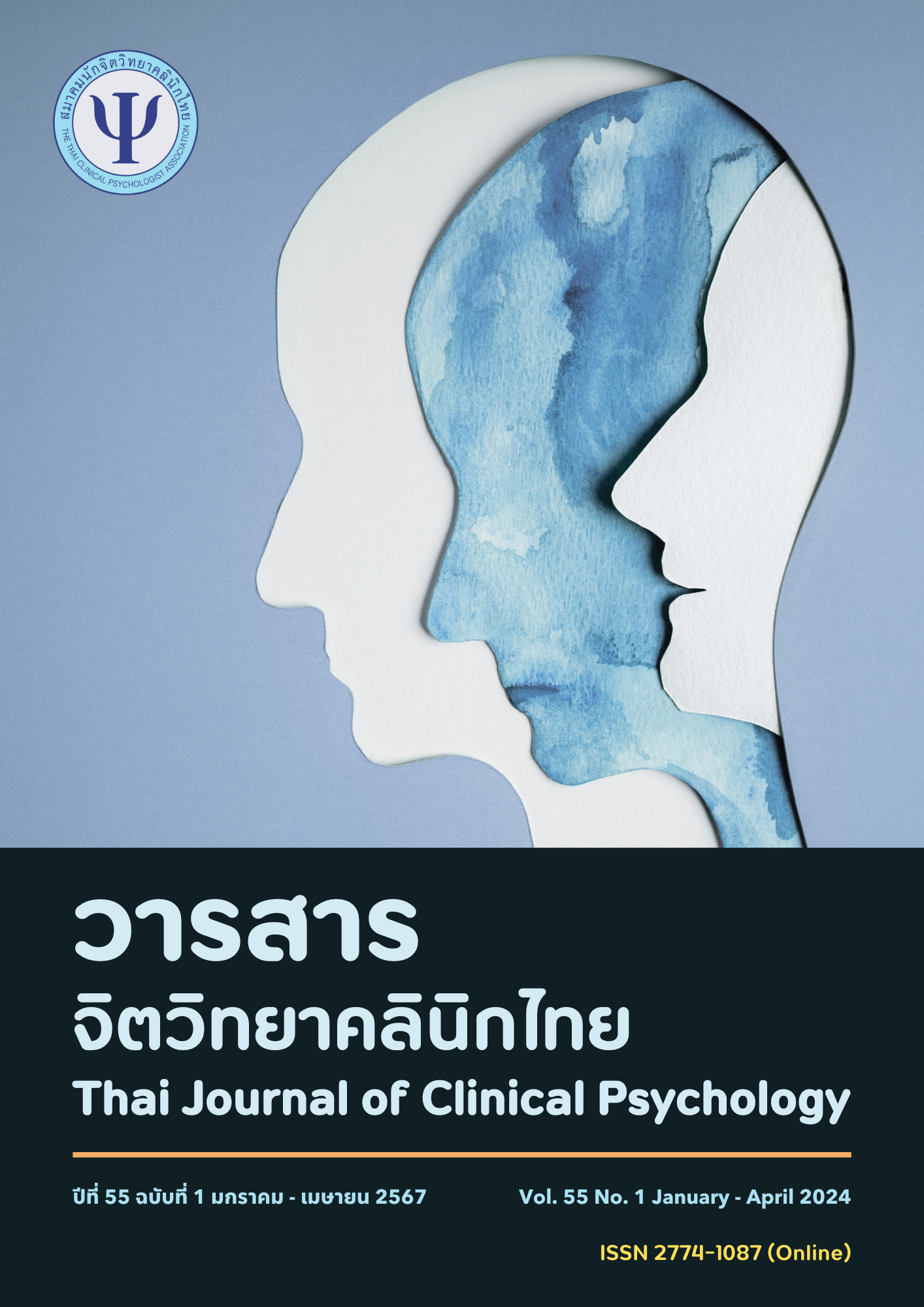The Influence of Self-efficacy and Coping with Stress Effect on the Adjustment of Students at Faculty of Education, Ramkhamhaeng University’s in a Pandemic COVID-19 Situation
Main Article Content
Abstract
Objectives: To study the influence of self-efficacy and coping with stress on the adjustment of students at faculty of Education, Ramkhamhaeng University in a Pandemic COVID-19 Situation. Materials and methods: A sample of 320 students studying in the faculty of Education at Ramkhamhaeng University were chosen by simple random sampling between November and December 2021. Data was gathered via a developed online questionnaire that included demographic characteristics questionnaire, self-efficacy questionnaire, coping with stress questionnaire, and students’ adjustment in a pandemic COVID-19 situation questionnaire. Statistics used in data analysis include: frequency, percentage, mean, standard deviation, and multiple regression analysis. Results: Finding reveals that self-efficacy (β=.56) and coping with stress (β = .17) were accounted for 47.20% of student’s adjustment in a pandemic COVID-19 situation (R2 = .472) at a statistically significant level of .01. Self-efficacy was the best predictor of student’s adjustment. Conclusion: Self-efficacy and coping with stress can predict student’s adjustment. Self-efficacy is a crucial ability that students should promote because it tends to improve adjustment if students have more of it.
Article Details

This work is licensed under a Creative Commons Attribution-NonCommercial-NoDerivatives 4.0 International License.
เรื่องที่ลงตีพิมพ์ในวารสารจิตวิทยาคลินิกแล้วถือเป็นลิขสิทธิ์การเผยแพร่โดยวารสารจิตวิทยาคลินิกแต่เพียงผู้เดียว การตีพิมพ์หรือเผยแพร่ซ้ำในที่อื่นต้องได้รับอนุญาตจากกองบรรณาธิการวารสารฯ
References
Ahn, S. M. (2020). The Influence of academic selfefficacy, critical thinking disposition and problem-solving ability on nursing freshmen’college adjustment in the distance education during COVID-19. Journal of Digital Convergence, 18(10), 315-323.
Aroundram. (n.d.). Sum up the admissions details.Retrieved December 13, 2023, from https://www.aroundram.com/courses/bachelor/reg/2566 (in Thai).
Audet, E. C., Levine, S. L., Metin, E., Koestner, S., & Barcan, S. (2021). Zooming their way through university: Which Big 5 traits facilitated students’ adjustment to online courses during the COVID-19 pandemic. Personality and
Individual Differences, 180(2021). 1-5.
Baker, R. W., & Siryk, B. (1984). Measuring adjustment to college. Journal of Counseling Psychology, 31(2), 179-189.
Bandura, A. (1989). Social cognitive theory. Annals of Child Development, 6, 1-60.
Computer institute of Ramkhamhaeng University. (2021). Academic year 2020: Student retention rate by program. Ramkhamhaeng University. (in Thai).
Cronbach, L. J. (1990). Essentials of psychological testing (5th ed.). Harper Collins.
Hongnaphadol, W., Ammawat, W., & Thammasittivate, N. (2022). Effect of self-efficacy, social support, course load, and fairness on the university student burnout prediction for English language learning. Journal of Education, Prince of Songkla University, 33(3), 95-114. (in Thai).
Hyeong-woo, K. (2021, May 12). Teachers worry about students losing social skills during pandemic: Survey. The Korea Herald. https://www.koreaherald.com/view.php?ud=20210512000760&np=1&mp=1
Krejcie, R. V., & Morgan, D. W. (1970). Determining sample size for research activities. Educational and Psychological Measurement, 30(3), 607-610.
Kuttanuwat, N., & Pontanya, A. (2022). Predictability of academic self-efficacy, digital literacy and social support on psychological well-being of undergraduate students in the situation of the Coronavirus disease epidemic (COVID-19).
Thai Journal of Clinical Psychology, 53(3), 13-30. (in Thai).
Lazarus, R. S., & Folkman, S. (1984). Psychological stress and the coping process. Springer.
Lohapattanabamrung, A. (2022, March 18). Emotional instability during adolescence. Department of
Mental Health. https://dmh.go.th/news/view.asp?id=2504 (in Thai).
Morales-Rodríguez, F. M. (2021). Fear, stress, resilience and coping strategies during COVID-19 in Spanish university students. Sustainability, 13(11), 5824. https://doi.org/10.3390/su13115824
Nasueb, S. (2021). Review report: COVID-19 outbreak's effects on the world economy and society, including Thailand. International Health Policy Program, Department of Disease Control. https://ddc.moph.go.th/uploads/publish/117
pdf (in Thai).
Nation Group. (2021, October 8). COVID-19 emergency increasing the risk of depression and suicide among children.
https://www.bangkokbiznews.com/social/964684 (in Thai).
Park, J. H., & Kang, S. W. (2022). College life adjustment, life stress, career barriers, and career decision-making self-efficacy of college students who have experienced COVID-19 in South Korea. Healthcare, 10(705), 1-11. https://doi.org/10.3390/healthcare10040705
Phochak, S. (2021, October 20). The stress rates. Department of Mental Health. https://www.dmh.go.th/news/view.asp?id=24 12 (in Thai).
Phonrakdee, K. (2022). Stress and stress management in online learning during the COVID-19 pandemic among the music education program students in faculty of education, Burapha University. Journal of Educational Measurement, 39(105). (in Thai).
Ramkhamhaeng University. (n.d.). Vision and mission. Retrieved December 13, 2023, from https://www.ru.ac.th/th/AboutUs/page?view=Vision (in Thai).
Ran, L., Wang, W., Ai, M., Kong, Y., Chen, J., & Kuang, L. (2020). Psychological resilience, depression, anxiety, and somatization symptoms in response to COVID-19: A study of the general population in China at the peak of
its epidemic. Social Science & Medicine, 262(2020), 1-6.
Stevens, J. P. (1992). Applied multivariate statistics for the social sciences. Lawrence Erlbaum Associates.
Tahara, M., Mashizume, Y., & Takahashi, K. (2021). Mental health crisis and stress coping among healthcare college students momentarily displaced from their campus community because of COVID-19 restrictions in Japan. International Journal of environmental Research and Public Health, 18(7245), 1-12. https://doi.org/10.3390/ijerph18147245
Thairath. (2021, February 24). COVID-19 has had the greatest impact on the mental health of young people aged 18-24 years. https://www.thairath.co.th/news/foreign/2038404 (in Thai).
Thinsandee, T., & Khunaprom, T. (2021). Educational disparities in epidemic situations of Infectious diseases, COVID-19. Ratanabuth Journal, 3(2), 63-68. (in Thai).
Thongliamnak, P. (2021, January 4). Exploring the impacts following COVID-19: A significant turning moment in global education. Thaipublica. https://thaipublica.org/2021/01/exploring-the-effects-of-covid-19-the-turningpoint-of-world-education/ (in Thai).
Unicef. (2021, October 8). The department of Mental Health and UNICEF note that COVID-19 Thai children's and teens' mental health continues to worsen as a result. https://www.unicef.org/thailand/th/pressreleases/ยูนิเซฟและกรมสุขภาพจิตชี้โควิด-19 (in Thai).
World Health Organization. (2023, March 28). Coronavirus disease. https://www.who.int/emergencies/diseases/novel-coronavirus2019/question-and-answers-hub/q-adetail/coronavirus-disease-covid-19


